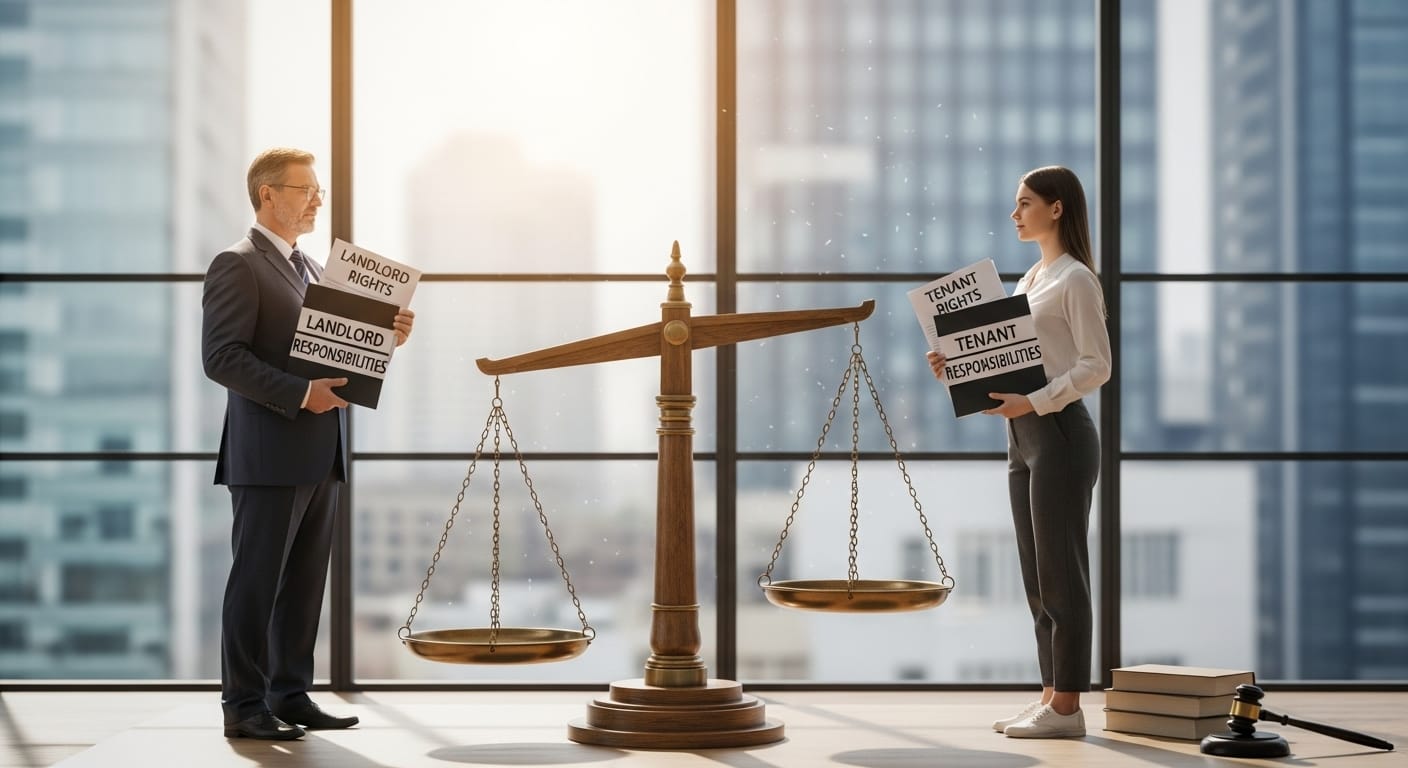Navigating the world of landlord-tenant relationships can feel a bit like walking through a minefield while juggling flaming torches. One wrong step, and you could be in hot water—or worse, facing eviction!
But don’t worry; I’m here to help you figure out who does what in this often confusing arrangement. So grab your favorite snack (I recommend popcorn), and let’s break it down.

Top Takeaways and Key Concepts
Understand your lease agreement to know your responsibilities and rights before signing it.
Know your tenant rights, including the right to habitable living conditions, privacy, and fair treatment.
Landlords must maintain property standards and promptly handle repairs to ensure livable conditions.
Communicate effectively with your landlord and document issues to resolve conflicts before they escalate.
Seek legal help if conflicts cannot be resolved through communication, including consulting an attorney or using mediation.
Summary of This Article
This article provides an overview of the essential rights and responsibilities in landlord-tenant relationships. It explains the importance of understanding the lease agreement, highlighting tenant rights such as the right to habitable living conditions, privacy, and fair treatment. It also outlines the landlord’s responsibilities, including maintaining the property and handling repairs promptly. The article emphasizes the importance of clear communication and documentation in resolving common issues like late rent payments, security deposit disputes, and unaddressed repairs. If conflicts escalate, it advises seeking legal help or utilizing mediation to avoid lengthy court battles.
The Basics of the Lease Agreement

First things first: what’s this magical document called a lease? In simple terms, it’s a contract between you and your landlord that outlines everyone’s rights and responsibilities. Think of it as the rules for living in your new castle—minus the moat and drawbridge.
A lease usually covers important details like how much rent you owe, when it’s due, and what happens if you pay late (hint: it usually involves fees).
It might also specify whether pets are allowed or if your landlord will paint your walls purple because they think it matches your personality. Spoiler alert: most leases have a no-pets clause unless you’re trying to sneak in an emotional support llama!
Understanding every detail is crucial because ignorance isn’t bliss when it comes to legal matters. If something seems unclear or downright bizarre (like why there’s a clause about not using fireworks indoors), ask questions before signing on the dotted line.
Tenant Rights: What You Should Know
As a tenant, you have rights that protect you from being treated like an unwelcome houseguest who overstays their welcome. Here are some essential rights:
1. Right to Habitable Living Conditions: Your place should be safe and livable—no one wants to live in a moldy cave with no heat during winter!
2. Right to Privacy: Just because your landlord owns the building doesn’t mean they can waltz in unannounced whenever they feel like it—unless there’s an emergency involving fire-breathing dragons or something equally dramatic.
3. Right to Fair Treatment: This means no discrimination based on race, gender, religion, or any other protected class. Everyone deserves respect—even those who insist on leaving dirty dishes everywhere!
If any of these rights are violated, remember that standing up for yourself is key! You’re not just another cog in the rental machine; you deserve respect too.
Landlord Responsibilities: What They Must Do
Now let’s flip the coin and talk about landlords—the folks who own the property but sometimes act like they’ve just stumbled off an alien spaceship when managing tenants. They do have responsibilities too! Here are some key ones:
1. Maintain Property Standards: Landlords must ensure that their properties meet safety codes and are fit for habitation (think running water instead of wishing wells).
2. Handle Repairs Promptly: If something breaks—like your refrigerator deciding it wants to take an extended vacation—it’s on them to fix it quickly so you’re not left living off instant noodles forever.
3. Respect Tenant Privacy: Just as tenants have privacy rights, landlords must provide notice before entering the premises (unless there’s an emergency). No surprise visits allowed!
Landlords need to understand that keeping tenants happy can lead to longer stays—and fewer midnight moves involving pizza boxes.
Common Issues Between Tenants and Landlords
Let’s face it; even with all these rules in place, misunderstandings happen more often than I accidentally spill coffee on my favorite shirt! Here are some common issues:
– Late Rent Payments: Sometimes life gets busy (or expensive), leading to late payments. A good landlord will work with tenants rather than immediately resorting to eviction notices—after all, we all love second chances!
– Security Deposits: Ah yes, the infamous security deposit—the money that feels like holding onto someone else’s pet hamster for safekeeping! Disputes often arise over whether deductions were fair or if damage was truly caused by neglect versus normal wear-and-tear.
– Repairs Not Made: Picture this scenario—you report a leaky faucet multiple times only for nothing to happen! That can lead anyone into frustration mode faster than finding out there’s no Wi-Fi at home.
Addressing these issues calmly can save both parties time—and possibly avoid costly court battles later down the road!
How to Resolve Conflicts Amicably
When conflicts arise between landlords and tenants (and trust me—they will), communication is critical! Here are some tips:
1. Document Everything: Keep records of communications regarding repairs or complaints made—that way everyone has proof when discussing issues later.
2. Talk It Out First: Before escalating matters legally or getting friends involved as mediators (who may side with one party unfairly), try discussing concerns directly with each other.
3. Know Your Options: If discussions fail miserably—a bit like trying to teach cats how to fetch—you may want mediation services or legal counsel depending on severity levels involved.
Remember—keeping things civil helps maintain peace within those four walls we call home!
When It’s Time To Seek Legal Help
Sometimes conflicts escalate beyond casual conversations over coffee—or maybe tea if that’s more your style! In such cases where resolution seems impossible:
1. Consult An Attorney: Seeking professional advice from someone who knows laws inside-out can clarify options available based upon specific situations faced.
2. File Complaints with Local Agencies: Depending upon violations experienced against housing regulations established locally/statewide organizations exist specifically designed for handling tenant grievances efficiently!
3. Consider Small Claims Court as a Last Resort: If damages exceed certain monetary limits defined by state law filing claims through small claims courts might become necessary ensuring justice served without lengthy proceedings typical higher-level courts involve taking place…
Taking action doesn’t mean abandoning hope altogether; just know when seeking outside assistance becomes necessary along journey toward resolution desired outcomes achieved ultimately benefitting everyone involved parties concerned here today too!
Suggested Resources:
Tenant’s Rights Handbook
https://www.nolo.com/legal-encyclopedia/tenants-rights-handbook-29725.html
Understanding Your Rental Agreement
https://www.consumerfinance.gov/ask-cfpb/understanding-your-rental-agreement-en-1855/
Landlord-Tenant Law Overview
https://www.lawhelp.org/resource/landlord-tenant-law-overview
Frequently Asked Questions
What is a lease agreement?
A lease agreement is a legal contract between a landlord and tenant that outlines rent terms, responsibilities, and property rules for both parties.
What rights do tenants have under the law?
Tenants have the right to safe, habitable housing, privacy from unauthorized entry, and protection from discrimination based on legally protected characteristics.
What are a landlord’s main responsibilities?
Landlords must maintain the property, make timely repairs, follow safety codes, and respect tenants’ privacy by providing proper notice before entry.
What are common issues between landlords and tenants?
Typical problems include late rent payments, disputes over security deposits, unaddressed repairs, and communication breakdowns about lease obligations.
How can tenants and landlords resolve conflicts?
Both parties should document issues, communicate directly, and consider mediation before resorting to legal action or filing formal complaints.
When should a tenant seek legal help?
Tenants should seek legal help when landlords violate lease terms, refuse essential repairs, illegally withhold deposits, or attempt unlawful evictions.
Why is understanding the lease agreement important?
Understanding the lease prevents misunderstandings about rent, maintenance, and responsibilities, helping tenants protect their rights and avoid disputes.

Kevin Collier is a legal expert passionate about simplifying complex legal concepts for everyday individuals. With a focus on providing clear, practical information, he covers a wide range of topics, including rights, responsibilities, and legal procedures. Kevin aims to empower readers with the knowledge they need to navigate the legal landscape confidently, ensuring they can make informed decisions regarding their legal matters. Through insightful articles and easy-to-understand resources, he helps demystify the law, making it accessible to all.










